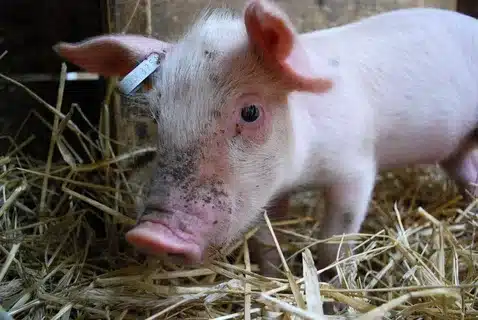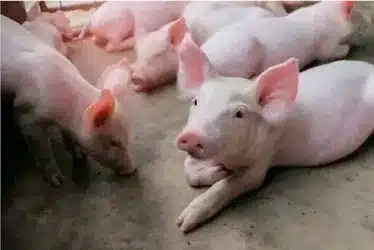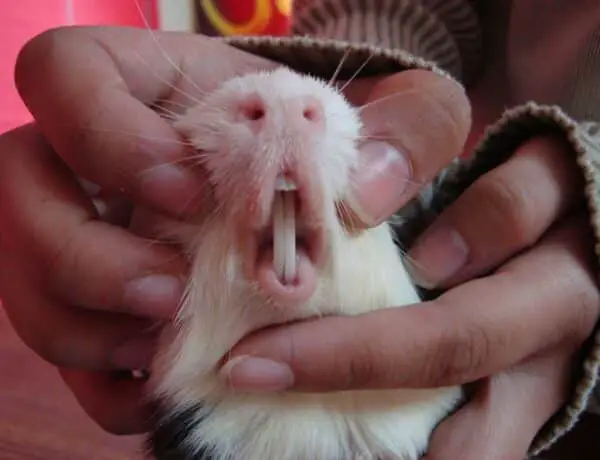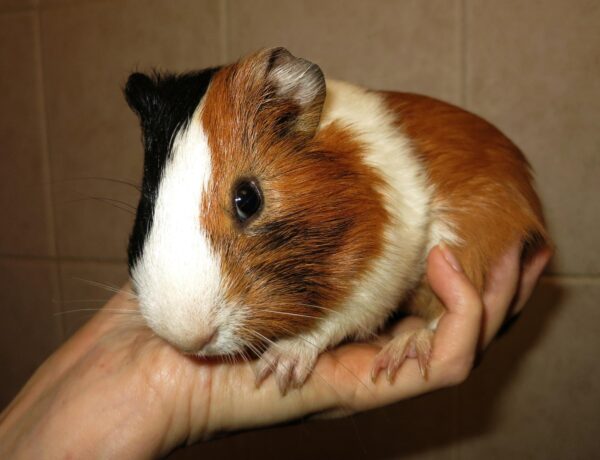Introduction
Why Do Pigs Squeal: Pigs are highly vocal animals, and their squealing is a form of communication that plays a crucial role in their daily lives. These vocalizations can convey a wide range of emotions, needs, and social interactions within pig communities. In this exploration, we delve into the multifaceted world of why pigs squeal, uncovering the underlying motivations and functions of this behavior.
From expressing pain and distress to signaling excitement and seeking social interaction, pig squeals are a rich tapestry of communication. They provide valuable insights into the physical and emotional states of these intelligent and social animals. Understanding the reasons behind pig squealing is not only essential for their welfare but also offers a glimpse into the complex social dynamics and emotional lives of pigs.
This article will take a comprehensive look at the various factors that drive pig squealing, shedding light on how this unique form of vocalization contributes to their well-being, social connections, and overall communication in the fascinating world of pigs.

Why do pigs make high pitched squeals?
In general, high pitched vocalizations are stress related while low pitched vocalizations are comfortable/relaxed communications between loved ones. A pig that whines, screeches or shrills is not happy (stress, agitation, challenging).
Pigs make high-pitched squeals primarily for communication purposes and as an expression of their emotions. These distinctive vocalizations serve various functions:
Distress and Pain: High-pitched squeals are often a response to distress or pain. When pigs are in discomfort or experiencing an injury, they emit sharp, loud squeals as a way to communicate their suffering to other pigs and potentially gain assistance. This is a crucial survival mechanism in a group-living environment.
Social Interaction: Pigs use squeals for social interactions within their group. They may squeal when excited, during play, or to engage with fellow pigs. These high-pitched sounds can signify enthusiasm, frustration, or a desire to interact, strengthening social bonds within the group.
Maternal Care: Piglets, in particular, emit high-pitched squeals to communicate with their mother. These calls can indicate hunger, discomfort, or a need for warmth, prompting the sow to provide maternal care and attention.
Environmental Factors: Changes in the environment, such as exposure to extreme temperatures or discomfort in living conditions, can also trigger high-pitched squeals in pigs. This behavior serves as an expression of their dissatisfaction with their surroundings.
What does it mean when my pig squeals?
There are loud grunts and soft grunts. Each has a different meaning. Barking: A warning of danger nearby OR this can mean your pig is having fun. Squealing: A sign of anticipation (usually when about to be fed) or a sign of pain.
Distress or Pain: When your pig squeals, it often signifies distress or pain. This could be due to an injury, illness, or discomfort. It’s crucial to investigate the cause and seek veterinary attention if needed to ensure your pig’s well-being.
Hunger or Discomfort: Squealing can also indicate hunger or discomfort, especially in piglets. If your pig is squealing and it’s feeding time or they seem uncomfortable, they may be trying to communicate their need for food or care.
Social Interaction: Pigs are social animals, and they use squeals for social interactions. They may squeal to get your attention, express excitement, or engage in play. In such cases, it’s a sign of their desire for social interaction and engagement.
Environmental Stress: Changes in your pig’s environment, such as extreme temperatures or an uncomfortable living situation, can lead to squealing. It’s their way of expressing their dissatisfaction or discomfort with their surroundings.
Seeking Attention: Some pigs may squeal when they want attention or companionship. If your pig is feeling lonely or isolated, they may use squeals to convey their desire for interaction with you or other pigs.
Why do pigs squeal when picked up?
When a pig feels threatened, it will squeal loudly. Usually very loudly. Obviously, when you are trying to pick up a baby pig you want to cuddle you are not a threat, but you have to remember that squealing is a natural response to something the piglet doesn’t like.
Startle Response: When you pick up a pig, it can trigger a startle response, especially if they weren’t expecting it. Squealing in this context can be a natural reaction to sudden movement or a feeling of being lifted off the ground.
Fear or Discomfort: Pigs may squeal when picked up if they are not accustomed to human handling or if they perceive it as a threat. Fear or discomfort can lead to vocalization as a way of expressing their unease.
Lack of Control: Pigs are creatures of habit and like to have a sense of control over their environment. When lifted, they may feel a loss of control, leading to squeals as they try to communicate their need for stability.
Communication: Squealing when picked up can also be a form of communication, signaling their need to be put down or their preference for being on solid ground. It can be their way of expressing their discomfort with the current situation.
Individual Variation: Some pigs may be more vocal than others when handled. Individual temperament and previous experiences can play a role in how a pig reacts to being picked up.
Do pigs squeal when scared?
For example, squeals are produced when pigs feel fear, and may be either alerting others to their situation or offering assurance.
Alarm and Fear Response: Yes, pigs often squeal when they are scared or alarmed. This is a natural and instinctual reaction to perceived threats or danger. When pigs encounter something that frightens them, such as a sudden loud noise, unfamiliar objects, or a potential predator, they emit high-pitched squeals as a way to communicate their distress and alert other pigs in the area.
Stress and Anxiety: Pigs can also squeal when they are experiencing stress or anxiety. Stressors can include changes in their environment, handling, or being in unfamiliar situations. Squealing in these contexts is a manifestation of their emotional state, indicating their discomfort or unease.
Social Hierarchy: In a group of pigs, squealing can be related to social interactions and hierarchies. Pigs may squeal when they feel threatened or challenged by other group members, especially during dominance disputes. These squeals help establish and maintain social order within the group.
Pain and Discomfort: Squealing can also occur when pigs are in pain or discomfort. This includes situations like injuries, illness, or physical discomfort, where squealing serves as a way to express their suffering and potentially receive assistance from their peers.
Can pigs squeal?
Not only do pigs have a lot to say, but they’re going to make sure they’re heard: a pig’s squeal can reach up to 115 decibels, which is higher than the sound of a supersonic concorde!
Yes, Pigs Can Squeal: Pigs are indeed capable of producing a wide range of vocalizations, and one of the most characteristic sounds they make is the squeal. These vocalizations can be quite loud and high-pitched, making them easily distinguishable.
Variety of Vocalizations: Pigs are not limited to squealing alone; they produce various vocalizations to communicate their needs, emotions, and social interactions. Alongside squealing, pigs can grunt, snort, chirp, and even roar, each sound conveying different messages.
Communication and Expression: Squealing in pigs serves multiple purposes. It can be an expression of excitement, a way to seek attention, or a sign of discomfort, distress, or pain. Pigs also use squeals for social interactions, particularly within their groups, as a means of communication and bonding.
Context Matters: Understanding the context of pig squealing is crucial. Different situations and emotions can lead to squealing, such as fear, joy, hunger, or even irritation. Recognizing the specific cues accompanying the squeals helps interpret what a pig is trying to convey.
How loud can a pig squeal?
A pig’s squeal can be as loud as 115 decibels – that’s 3 decibels higher than the sound of a supersonic airliner.
Loud and Distinctive: Pigs are known for producing loud and distinctive squeals that can be heard over considerable distances. The volume of a pig’s squeal can vary, but it often reaches levels that are easily discernible to the human ear.
High-Pitched: Pig squeals are typically high-pitched sounds, which is why they are so conspicuous. These high frequencies make them stand out in various environments.
Distress Calls: When a pig is in distress or experiencing pain, its squeals can be particularly loud and piercing. These distress calls serve as an alarm to signal to other pigs or caregivers that something is wrong.
Social and Communication: Pigs also use their vocalizations, including squeals, for social interactions. In group settings, they may squeal to communicate excitement, assert dominance, or engage in play. These social squeals can be relatively loud but may not reach the same piercing intensity as distress calls.
Environmental Factors: Environmental conditions, such as the presence of obstacles or sound-absorbing materials, can influence how far a pig’s squeal travels. In open spaces, their squeals can carry quite far, enhancing their effectiveness as a means of communication.
Do pigs squeal when happy?
In general, high pitched vocalizations are stress related while low pitched vocalizations are comfortable/relaxed communications between loved ones. A pig that whines, screeches or shrills is not happy (stress, agitation, challenging).
Limited Evidence: While pigs are known to produce a wide range of vocalizations, including squeals, in various situations, the idea that pigs squeal specifically when they are happy is not well-supported by scientific research.
Expressing Happiness: Pigs do have ways of expressing contentment and well-being, such as through body language and behavior. They may display relaxed postures, engage in playful activities, or exhibit behaviors like tail wagging. However, vocalizing happiness with squeals is not a common or well-documented phenomenon.
Squealing in Different Contexts: Pigs are more likely to squeal in response to distress, pain, fear, or during social interactions. In these contexts, squealing serves as a means of communication and expression of their emotions or needs.
Individual Variability: It’s important to note that individual pigs can have unique personalities and behaviors. While some pigs may exhibit vocalizations in a joyful context, it’s not a universal behavior among all pigs.
Interpretation: What might be perceived as happiness in pigs can vary depending on their specific environment and experiences. Pigs can certainly experience positive emotions, but they tend to communicate these feelings more through non-vocal means.
What is a pigs squeal louder than?
A pig’s squeal can be as loud as 115 decibels – that’s 3 decibels higher than the sound of a supersonic airliner. 5. And when they’re not squealing, they’re talking. Pigs communicate constantly with each other, and more than 20 different vocalizations have been identified; from wooing a mate to saying ‘I’m hungry!”
Human Conversation: A pig’s squeal can often be louder than typical human conversation. While the volume of human speech can vary, especially in noisy environments, a pig’s squeal can easily surpass the decibel level of a normal conversation.
Moderate Ambient Noise: In moderate ambient noise conditions, such as those found in a typical household or outdoor environment, a pig’s squeal can cut through the background sounds and be distinctly audible.
Some Household Appliances: Pigs can squeal louder than common household appliances like a running dishwasher or washing machine. This can make their squeals particularly attention-grabbing in a home setting.
Quiet Natural Sounds: A pig’s squeal can overpower quiet natural sounds, such as rustling leaves or chirping birds. In a serene outdoor setting, the high-pitched nature of their squeals makes them stand out.
Soft Music: Pigs’ squeals can easily drown out soft or ambient music playing in the background, making their vocalizations prominent and hard to ignore.

Conclusion
Pig squealing is a multifaceted form of communication that holds a pivotal role in the lives of these intelligent and social animals. This vocalization serves various functions, providing insights into their emotions, needs, and social interactions.
Pigs squeal to express distress and pain, signaling to others when they are in discomfort. It serves as a crucial alarm system in group-living environments, allowing pigs to alert their peers to potential threats or issues.
Squealing also plays a role in excitement and social interactions, enabling pigs to convey their enthusiasm or engage with fellow group members. It strengthens social bonds and fosters communication within pig communities.





No Comments